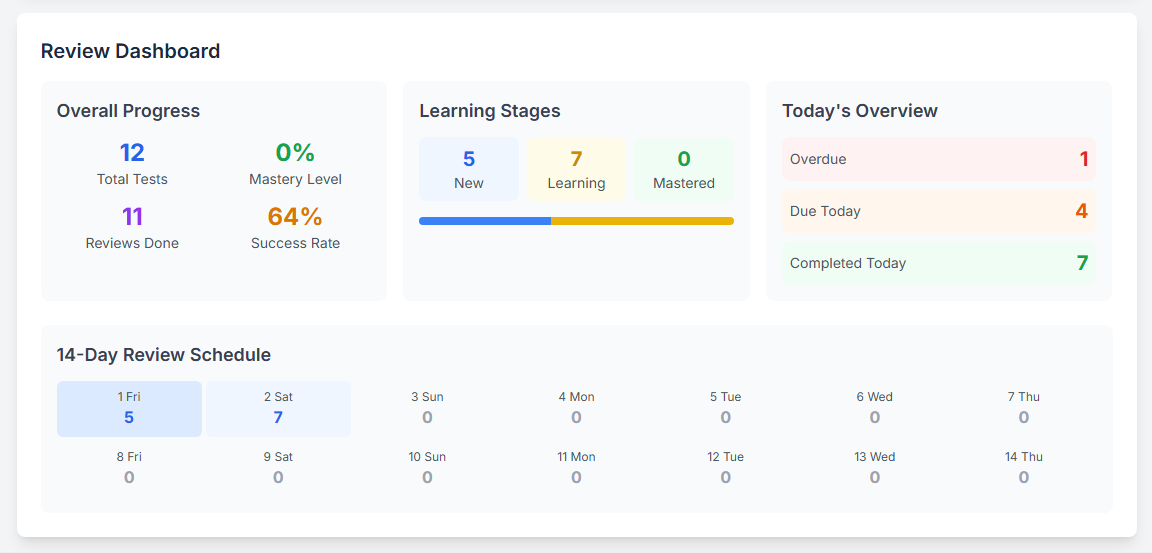Last weekend when I was out for a 10K run I listened to an episode of the Huberman podcast about how to study and learn. Something relevant for chess improvers is finding the best way to spend your limited study time. After the 1 hour and 40-minute long monologue, what stood out to me was the value of self-testing.
Here are some key quotes that stood out to me about the value of testing:
Testing immediately after learning
“Test yourself on the material that you were just exposed to very soon after your first exposure to it because that offsets the natural forgetting of new material that the brain is exposed to. This is absolutely the hallmark of all the impressive data about testing as a tool for learning.” (1h 6m)
Study on self-testing benefits
“There's a classic study ... where grade school age children read biographies... [One group] read and re-read... Another group... read once, then tested themselves on those biographies simply by having to think about the information.” Despite being exposed to the material once, children who self-tested vastly outperformed those who re-read repeatedly.” (45m)
Testing vs. re-reading
"Reading and rereading material ... is far less effective than reading material and then thinking about that material, Testing Yourself on that material, forcing yourself to bring that material to mind in your own mind." This approach improves both "volume of material" remembered and "accuracy of recall." (47m)
Reducing forgetting through testing
“If I had known that testing oneself or being tested soon after exposure to material would halve the amount of forgetting even out to a year later, I definitely would've saved myself a lot of time” (1h 15m)
So there seem to be several good arguments for trying out this method for chess study. Just not to rely on Huberman as a source a study published in Psychological Science by cognitive psychologists Henry Roediger and Jeff Karpicke examined the effects of self-testing on memory retention.
Their findings revealed that students in one experiment in which they engaged in self-testing retained approximately 60% of the material after a week, compared to 40% retention in those who solely relied on study1 in another experiment with we look at the dotted line indicating how fast we humans forget if we do not reuse the information it is clear that a quick test after learning something is very useful for retention. In a way it makes sense that we tell the brain that this information is really important to remember when we shortly after take the test.

One might argue that chess, as a skill-based game, relies more on practical ability than simply remembering information or patterns. However, one of the chess players I follow on Substack is
, who writes , is a practitioner of this method. In his interview with he mentioned the importance of using self-testing with flashcards and with a 400 rating gain, it is hard to argue against using this method.My hesitation with the flashcard method—and why I haven’t fully embraced it (yet)—is that the creation process feels cumbersome, even though I recognize its benefits.
To overcome this, I’ve been exploring ways to integrate it more seamlessly into the chess tracker I’m developing.
Chess tracking with testing
The Huberman podcast inspired me to implement the testing method for chess training into CentiChess. Therefore, I have added an add test button to each session.
The user can then after reviewing the game select a FEN and press add test. Next, the task is to write a question and an explanatory answer. This is then saved in the user test database.
When the user has found or recalled the solution the solution is revealed by pressing show answer. Here I actually would like to know if I should add an optional box where you could type out the solution before looking at the answer, so you better can judge your performance. The downside is this is a bit of a slower method, while it might be better for learning and self-assessment.
Next, the user rates the quality of the reply, which is stored in the database, and will decide when the next spaced repetition of the test is planned. I have used the so-called Supermemo 2 algorithm for this.
Finally, I have added a dashboard for an overview of the progress and future reviews.
This is how far I have come working on this project for the last 25 days. Not yet completely ready to invite users in, but I’m starting to get excited about what I have made and to use it.
/Martin
https://gwern.net/doc/psychology/spaced-repetition/2006-roediger.pdf







Centichess looks awesome
Make It Stick advocates for quizzing. So does Anique de Bruin, who Ben Johnson has interviewed.